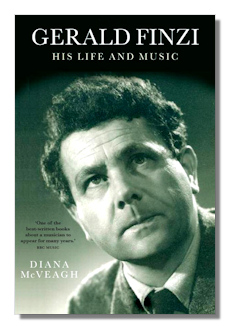
The Internet's Premier Classical Music Source
Related Links
-
Introduction
Acoustics
Ballet
Biographies
Chamber Music
Composers & Composition
Conducting
Criticism & Commentary
Discographies & CD Guides
Fiction
History
Humor
Illustrations & Photos
Instrumental
Lieder
Music Appreciation
Music Education
Music Industry
Music and the Mind
Opera
Orchestration
Reference Works
Scores
Thematic Indices
Theory & Analysis
Vocal Technique
Search Amazon
Recommended Links
Site News
 Book Review
Book Review
Gerald Finzi

His Life and Music
Diana McVeagh
The Boydell Press, 2005; paperback 2010. 306 pages
Illustrations
ISBN-10: 1843831708 hardback
ISBN: 978-1-84383-170-9 hardback
ISBN: 978-1-84383-602-5 paperback
This assuredly is the definitive biography of this well-known, if minor, twentieth century English composer. Finzi was born in 1901 and died in 1956, a life-span about the same as Beethoven's. He is known particularly for his songs, especially those based on the poems of Thomas Hardy, for his clarinet and cello concertos, and for his major vocal works Dies Natalis and Intimations of Immortality, the latter based on the Wordsworth poem of that title. His 3000-volume library included much poetry.
Finzi lived mostly in the countryside, except for some periods in London, and grew an enormous variety of apples. He was married to a beautiful tall woman named Joy Black, an artist with whom he fell in love at sight. (It took her longer – and a third proposal – to commit to him.) The Finzis were not wealthy but devoted available funds to things they valued highly. They had two sons, one called Kiffer was particularly musical and talented as a conductor. Gerald Finzi founded a small orchestra, Newbury String Players (regrettably referred to often by McVeagh simply as NSP.) The early players were local amateurs, and evidently not very good, but they were later joined by some professional players and eventually had a large repertoire.
Finzi was a friend of the much older Ralph Vaughan Williams, who outlived him, as well as the composers Robin Milford, Kenneth Leighton, Arthur Bliss, and others less well known than he was. Finzi had conservative musical tastes and expressed shockingly dismissive critical comments on a number of significant composers including even Benjamin Britten. He made an exception for Peter Grimes. But Berlioz' Harold in Italy came in for particular scorn.
McVeagh, for her part, as she analyses Finzi's works, does not hesitate to criticize details in them. The author of a book on Elgar, and another of a New Grove publication on a number of British composers, she has been writing about Finzi's music since at least 1980 and her preface demonstrates that she has interviewed many people who knew the composer, including Joy Finzi, who gave McVeagh access to her own journal and other material.
Joy Finzi, the composer's wife, mentions the author in her journal as "little Diana McVeagh," who had just been first met with pleasure. Joy said, "We were charmed by her personality. A great character for one so apparently demure and young." This was in 1956, after the first performance of Finzi's Cello Concerto, and offered by McVeagh in the context of remarks about some negative newspaper comments directed about the composer. This is McVeagh's only self-referential report, serving to place her in time and as someone acquainted, if barely, with her biographical subject. Unfortunately, Finzi was dying at the time, so it is mainly through Finzi's music that McVeagh has known him.
McVeagh clearly writes from a position of musical expertise. Her musical analysis is presented as the works appeared in the course of Finzi's life. One of the reviewers on Amazon for this book found the analysis too challenging, but he did not hold that against McVeagh; he simply skimmed over it. Experts, however, will appreciate it. McVeagh does not defend Finzi's music as some kind of advocate, but criticizes it objectively.
Reviewers have praised McVeagh's writing. For my own part, I took great satisfaction in a page (174) comparing and contrasting the minds of Finzi and Thomas Hardy. But I would be happier with the writing if McVeagh included fewer minor (not to say trivial) events, which sometimes makes for slow going. and if she were less confident in the reader's ability to recall the identity of a number of little-known individuals following their first mention many pages previous. But readers interested in as full an account of the life of this composer will be able to turn to it for reference.
Appendices include a Catalogue of Works, Bibliogarphy, Newbury String Players' Repertory, and Joy Finzi's brief Memoir of Gerald. A general index if followed by an index of Finzi's compositions. As always with Boydell's books, production values are outstanding. Even the paperback edition, reviewed here, opens nearly flat.
Copyright © 2016, R. James Tobin


















